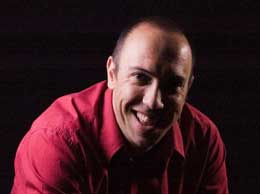23 July 2012
 Einstein’s famous theory of relativity proposed that matter can distort space and time. Now a new study recently published in the journal Neurology suggests that chronic pain can have the same effect.
Einstein’s famous theory of relativity proposed that matter can distort space and time. Now a new study recently published in the journal Neurology suggests that chronic pain can have the same effect.
Neuroscientists from the University of South Australia, Neuroscience Research Australia and the University of Milano Bicocca in Italy, studied people with chronic back pain, the most common painful condition which costs western countries billions of dollars in lost productivity every year.
They presented identical vibration stimuli to the painful area and a non-painful area and noted that the stimuli were processed more slowly by the brain if they came from the painful area.
The most striking finding, however, was that the same effect occurred if the stimuli were delivered to a healthy body part being held near the painful area.
Lead author of the study, Professor Lorimer Moseley from the University of South Australia, says it was not altogether surprising that, in people with chronic pain, there are changes in the way the brain processes information from and about the painful body part.
“But what is remarkable is that the problem affects the space around the body as well as the body itself,” Prof Moseley says.
Experiments showed that if a hand was held near the painful area of the back, the brain would almost ‘neglect’ that hand.
“The potential similarity between our findings and the time-space distortion predicted by the relativity theory is definitely intriguing,” Prof Moseley says.
“Obviously, here it is not external space that is distorted but the ability of the brain to represent that space within its neural circuitry.
“This finding opens up a whole new area of research into the way the brain allows us to interact with the world and how this can be disrupted in chronic pain.”
The findings are published in the leading neurology journal, Neurology.
Prof Moseley is Professor of Clinical Neurosciences and UniSA's inaugural Chair in Physiotherapy. He runs two research groups – one at UniSA’s Sansom Institute for Health Research and one at NeuRA in Sydney.
Contact for interview Prof Lorimer Moseley phone (08) 8302 1416
Media contact Kelly Stone mobile 0417 861 832 email kelly.stone@unisa.edu.au


